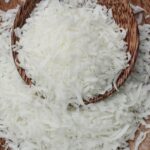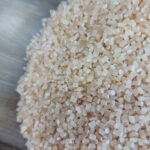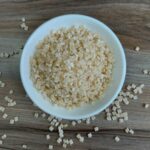CASHEW NUT SHELL OIL
In today’s highly competitive food manufacturing landscape, ensuring that products like ketchup maintain a high level of consistency and quality is paramount. One key ingredient that is making waves in the production of ketchup is modified tapioca starch. This versatile and efficient thickening agent is becoming a popular choice among manufacturers looking for ways to optimize texture, improve stability, and extend shelf life. Below, we explore seven key benefits of using modified tapioca starch in ketchup production, particularly for achieving smoother consistency.

Table of Contents
Toggle1. Superior Thickening and Texture Control
One of the most important qualities that consumers expect from ketchup is its thick, rich texture. Modified tapioca starch acts as an excellent thickening agent, helping manufacturers achieve that signature viscosity that ketchup is known for. Unlike traditional starches, modified tapioca starch has been chemically or physically altered to perform more effectively under a range of conditions, such as high temperatures or varying pH levels. This ensures that the ketchup maintains its desired consistency throughout the production process and during its shelf life, providing a smooth and uniform texture in every squeeze.
2. Improved Stability and Shelf Life
Ketchup often experiences phase separation, where water and solids split over time, leading to an unattractive product appearance and uneven texture. Modified tapioca starch helps to stabilize the ketchup by binding the ingredients together, preventing separation. The result is a longer shelf life, as the ketchup remains homogenous and visually appealing for an extended period. The starch’s ability to withstand temperature fluctuations and acidic conditions also ensures that it retains its functionality in various packaging and storage environments, offering consumers a reliable product every time they open the bottle.
3. Cost Efficiency in Production
Cost is a critical factor in food manufacturing, and using modified tapioca starch can lead to significant savings. This starch offers excellent water-binding properties, which allows manufacturers to use less of other, more expensive ingredients while maintaining the same product volume and quality. Moreover, tapioca starch is derived from cassava, which is widely available in many regions, particularly in Asia. Its abundant supply means that it tends to be more cost-effective compared to other starches, such as corn or potato starch, making it an economically viable option for large-scale ketchup production.
4. Enhanced Mouthfeel
The consumer experience is a key consideration in product formulation, and modified tapioca starch contributes to an improved mouthfeel in ketchup. It creates a smooth, creamy texture that coats the palate evenly, which is highly desirable for sauces like ketchup. This quality is particularly important as consumers increasingly seek premium ketchup products with refined textures. The use of modified tapioca starch allows manufacturers to deliver a product that feels luxurious and satisfying, elevating the overall eating experience for the consumer.
5. Clean Label and Gluten-Free Claims
In today’s market, more and more consumers are looking for products that are natural, gluten-free, and align with clean-label trends. Modified tapioca starch fits the bill perfectly. It is derived from cassava, a naturally gluten-free crop, making it a safe and desirable ingredient for consumers with gluten sensitivities or those following a gluten-free diet. Additionally, modified tapioca starch can be labeled as a natural ingredient, which appeals to health-conscious consumers who are wary of artificial additives and preservatives in their food products.
6. Improved Process Tolerance
During the production of ketchup, manufacturers often need to heat the mixture to high temperatures and expose it to shear forces in the mixing process. Many starches tend to break down under these harsh conditions, losing their thickening properties and destabilizing the product. However, modified tapioca starch is specially designed to be more resilient. It retains its thickening power and stabilizing abilities even when subjected to high heat, acidic conditions, or intense mechanical processing. This makes it an ideal ingredient for the demanding conditions of ketchup production, ensuring consistency and stability throughout the process.
7. Versatility in Formulation
Lastly, modified tapioca starch offers a great deal of flexibility in product formulation. It can be customized to achieve different levels of viscosity, transparency, and stability, allowing ketchup manufacturers to tailor the final product according to their specific needs. Whether they are producing a standard ketchup, a low-calorie version, or a gourmet product with enhanced mouthfeel, modified tapioca starch can be adjusted to meet these requirements. Its versatility also extends to other sauces and condiments, making it a valuable multi-functional ingredient in any food production facility.

Conclusion
In the highly competitive ketchup industry, consistency and quality are non-negotiable factors for success. By incorporating modified tapioca starch into their production processes, manufacturers can achieve a smoother, more stable product that satisfies consumer demands for premium quality and texture. From superior thickening and texture control to enhanced stability, improved mouthfeel, and cost-efficiency, the benefits of using modified tapioca starch in ketchup production are clear. As consumers continue to seek out products that meet their expectations for taste, texture, and clean-label ingredients, modified tapioca starch stands out as an essential component in modern ketchup manufacturing.












